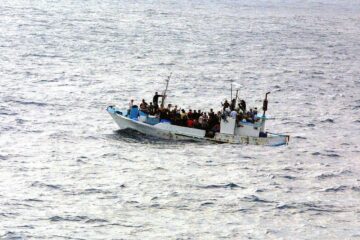![]()
Introduction:
Human rights are the basic rights and freedoms, given to each and every person right from their birth, up till the last breath of the person, there are restrictions however those are reasonable restrictions that are necessary so that no one overrides the rights or freedoms they are authorized to. These rights are inherent rights of every human, whatever be their religion, gender, sex, place of birth, race, residence or any of them. These human rights are based on proving equality with the perspective of equity, freedom, and independence and to maintain fairness to every human being. These rights are been defined and protected by law.
Some of the rights are:
- Right to life
- Right to life and liberty
- Right to education
- Freedom of speech and expression
Terrorism
Terrorism is derived from a Latin word ‘terrorem’ which means to s alarm, panic, or say great fear this term was used in the period of the French Revolution known as ‘Reign of Terror’.
Terrorism means violence against a countries public, the reason behind may be political or religious. It is a criminal act, it is not only suffered by a single person referred to a victim or to only a group of people, however, it is against the whole public, it is the whole public, the whole nation who suffers terrorism.[1]
In November 2004, terrorism was described as “Any act intended to cause death or serious bodily harm to civilians or non-combatants with the purpose of intimidating a population or compelling a government or an international organization to do or abstain from doing any act” in the United Nations Secretary-General report.[2]
Anti-terrorism
Every country in the world tries to remove terrorism acts from their country and to do so they implement some measures, these measures are known as anti-terrorism acts and laws. Anti-terrorism is also known as counter-terrorism. Anti-terrorism is the opposite of terrorism, which means a fight to terrorism. In this, the Government takes some initiatives to reduce or remove terrorism from the country.
Special Laws in India on Anti-Terrorism
Preventive Detention Act, 1950
Preventive detention is an action considered on grounds of suspicion that the person has done some wrong actions. However the misuse of the preventive detention act by the police is possible, therefore, protection for such is been protected by law under Article 22 of the Indian Constitution.
The Preventive Detention Act, 1950 was originally been passed just for a year, however it was periodically extended till 1969. During this period, it was again and again challenged in the Supreme Court, for its validity and hence was amended from time to time. Again in 1971, there was a need to frame a new Preventive Detention Act, and as a result, was framed with the object “maintaining internal security”, the act was the Maintenance of Internal Security Act, 1971, and it was this act which was misused to settle all political opposition during the period of emergency, and this misuse was recognized by the Supreme Court, as the executive got the extraordinary power[3] as absolute power corrupts absolutely.
The Armed Forces Special Powers Act, 1958
This act came into being on September 11, 1958. Through, these act special powers are provided to the members of the Armed Forces in distributed areas in the states of Assam, Nagaland, Manipur, Meghalaya and Tripura and the Union Territories of Mizoram and Arunachal Pradesh.
The Terrorist Affected Areas (Special Courts) Act, 1984
This act was promulgated on 14 July, 1984. The object of this act is to provide the speedy trial of the offenses which take place in terrorist affected areas and for the matters related to it.
The Terrorist and Disruptive Activities (Prevention) Act, 1985
This act came into force on 24 May 1985. This act was framed for a period of two years. The objective of framing this act was for prevention and coping with terrorist and disruptive activities and for the matters related.[4]
The Terrorist and Disruptive Activities (Prevention) Act, 1987
This was the same act TADA, 1985; it was to expire on 23 May 1987. However, both the houses of Parliament were not in session and the need of this act was necessary not just to carry on with the same law but to strengthen it, therefore the President Promulgated the Terrorist And Disruptive Activities (Prevention) Ordinance,1987 on 23 May, 1987 which came into force w.e.f. May 24, 1987.[5]
The Prevention of Terrorism Act, 2002
This act was passed on 26 March, 2002. This act was framed considering the terrorist activities by various groups sponsored by foreign elements in several parts of the country. Finally, as a result, the Government decided to have an alternative law to effectively deal with the terrorist. In accordance with this, the Government enacted another act, POTA.
Unlawful Activities (Prevention) Amendment Act, 2004
In this act the particular word, terrorist is not defined, however a terrorist act is been defined, under the definition clause that is Section 15 of the act, which is as “Whoever, with the intention to threaten the unity, integrity, security or sovereignty of India or to strike terror in the people or any section of the people in India or in any foreign country/, does any act by using bombs, dynamite or other explosive substances or inflammable substances or firearms or other lethal weapons or poisons or noxious gases or other chemicals or by any other substances (whether biological or otherwise) of a hazardous nature, in such a manner as to cause, or likely to cause, death of, or injuries to any person or persons or loss of, or damage to, or destruction of, property or disruption of any supplies or services essential to the life of the community in India or in any foreign country or causes damage or destruction of any property or equipment used or intended to be used for the defence of India or in connection with any 193 other purposes of the Government of India, any State Government or any of their agencies, or detains any person and threatens to kill or injure such person in order to compel the Government in India or the Government of a foreign country or any other person to do or abstain from doing any act, commits a terrorist act.”[6]
Unlawful Activities (Prevention) Amendment Act, 2008
This is the amended act of the first law made in India for Terrorism as well as Terrorist activities, which came into force on 30 December, 1967 named The Unlawful Activities (Prevention) Act, 1967 (UAPA). The UAPA was framed to deal with the associations and activities that questioned the territorial integrity of India and in 2008, the Amended Act has amended certain provisions with the view to strengthening the law to deal with terrorism.
Can restriction on civil liberties for the sake of public safety is justified?
Civil liberties are the basic rights and freedoms that are guaranteed to all the people of a country by the Constitution. In India, Civil Liberties are enshrined in Part III of the Constitution of India as Fundamental Rights. These fundamental rights are considered a crucial part of the protection of the rights and liberties of people against the encroachment of the power delegated by them to their Government. With civil liberties comes some restrictions, these restrictions are implemented for public safety and needs.
Absolute civil liberties without any restrictions cannot exist in a Modern Welfare State because these absolute rights can harm the liberty of other people in society. Civil liberty implies the existence of an organized society that maintains public order, without which liberty itself would be lost in the excess of unrestrained abuse.[7] If a person will get absolute freedom of speech and action then it will result in chaos and anarchy. However, if the State has absolute power to put restrictions on civil liberties then it will result in tyranny.
Hence, it was rightly said by Lord Acton, “Powers tend to corrupt, but absolute power corrupts absolutely.” Therefore, to maintain the balance between individual liberty and social control the Indian constitution has set some limitations on the Fundamental Rights within which they can be curtailed and these limitations are called reasonable restrictions. So, For having public safety and public order, if the civil liberties are restricted to some extent in a reasonable and non-arbitrary manner then the restriction on civil liberties for the sake of public safety is justified.
Human Rights under Anti-Terrorism Laws
The Law of the Land that is the Constitution of India provides every person the basic rights that are Right to life, liberty, and security. It is regarded as the most fundamental right out of all. The right to live in the Indian constitution is embodied under Article 21. Article 21 says that “No person shall be deprived of his life or personal liberty except according to the procedure established by law.” This provision is available to both citizens as well as non-citizens.[8]
Right to Life
The Supreme Court has held in various judgments that the right to life is one of the basic human rights that are guaranteed to every person by Article 21 of the Constitution and no one has the power to violate it not even the State. In India Right to life is given to each and every individual who is within the Indian territory, even the prisoners in Judicial Custody are given the right to life and this was also stated in one of the judgments of the Supreme Court of India which they referred from a Landmark Judgement of The Supreme Court of United States.[9] The Supreme Court of the United States held that prisoner does not cease to be a human being even when lodged in jail; he continues to enjoy all his fundamental rights including the right to life.[10]
If the life of a person who committed a crime or an offense is taken away by the State, without the procedure established by the law, then it would be a violation of Article 21 of the Constitution. In the case Asfaq v. State of Rajasthan[11], the Supreme Court held that “The basic Fundamental Rights under Article 21 of the Constitution are also given to the prisoners, however, rights are restricted upon the facts of imprisonment of the prisoner. The State grants right to life to all the prisoners and even to prisoners who had committed an act of terrorism.
Right to Health and Medical Treatment
The Right to health care is an essential ingredient under Article 21 of the Constitution and this has also been held by the Supreme Court in numerous cases. Preserving a life is an obligation on the State under Article 21 of the Constitution. Every doctor whether at a Government hospital or otherwise has a duty-bound obligation to extend his services with due expertise for the protection of life without any discrimination against the patient. There is law or State action that can intervene to avoid or delay the discharge of the obligation that is cast upon doctors.[12] Every prisoner has been given this human right by the State and this right is also granted under anti-terrorism.
Right to Free Legal Aid
A majority of the prisoners in the country are under trials and there are some prisoners whose trials have yet to commence. Thus, access to court and legal facilities is essential for giving a free and fair trial to these prisoners. The Supreme Court has observed that under Article 21 every prisoner has the right to have free legal aid despite the nature of the crime he committed.[13] So this human right is also given under Anti-terrorism laws.
Protection from Custodial Torture
In India custodial brutality has been prohibited by the Supreme Court of India because it infringes the offenders Right To life under Article 21. According to Article 5 of the Universal Declaration of Human Rights, it is stated that “No one shall be subjected to torture or to cruel, inhuman or degrading treatment or punishment”.[14] In India, the police cannot use third-degree torture against any prisoner because it will violate his human right. Therefore, prisoners who committed an act of terrorism are also protected from Custodial violence
Conclusion
In ancient times, as there was no proper law and order, and therefore, the prisoners had no rights and so, they were treated cruelly. However, in the current times, law and order have developed drastically and today in modern India and today, in modern India we have laws for almost every concerning issue. Every human being, have been given some basic rights which are with them from the very birth. These rights are called human rights. Today, in a welfare state, these human rights are been given to each and every individual from a mere a child to a grown-up, from poor to rich, from soldiers to even prisoners also.
Human Rights are negatively impacted by many things but it gets impacted the most by Terrorism activities. In a Terrorist activity, people’s essential human rights are taken away. When the person who did the terrorist act gets caught then he is given basic human rights and he also gets all the benefits from the human rights that are under the anti-terrorism laws. This is the beauty of human rights, it is given to each and every living being despite his or her actions and the reason behind this is that according to Law there are some basic rights of a person that not even the State can take away from him.
References:
[1] An Anarchist FAQ — Section A. (n.d.). Theanarchistlibrary.Org. Retrieved September 3, 2020, from https://theanarchistlibrary.org/library/afaq-a.html
[2] TERRORISM: MEANING, TYPES, CAUSES AND EFFECTS. (n.d.). Shodhganga. Retrieved September 1, 2020, from https://shodhganga.inflibnet.ac.in/bitstream/10603/208975/6/06_chapter%202.pdf
[4] Singh, A. K. (2020, July 31). Overview on Safeguards against Arrest. Indian Law Portal. https://indianlawportal.co.in/overview-on-safeguards-against-arrest
[5] Ibid.
[6] The Unlawful Activities (Prevention) Amendment Act, 2004. (n.d.). Indian Kanoon. Retrieved September 6, 2020, from https://indiankanoon.org/doc/1499542/
[7] Fox v. New Hampshrire (1941) 312 US 569 at p. 574
[8] Competitive Exams: Political Science Study Material: Fundamental Rights- Examrace. (n.d.). Www.Examrace.Com. Retrieved September 5, 2020, from https://www.examrace.com/Study-Material/Political-Science/Fundamental-Rights-Article-14-18.html
[9] admin. (2019, June 6). Article 21 of the Constitution of India- Right to Life and Personal Liberty. Our Legal World. https://www.ourlegalworld.com/article-21-of-the-constitution-of-india-right-to-life-and-personal-liberty/
[10] State of Andhra Pradesh v. Challa Ramkrishna Reddy, AIR 2000 SC 2083
[11] AIR 2017 SC 4986
[12] Rights of Prisoners. (2019, April 6). Radhey Krishna Legal Aid Foundation. http://www.radheykrishnafoundation.org/rights-of-prisoners/
[13] Ibid.
[14] Rights of Prisoners. (2019, April 6). Radhey Krishna Legal Aid Foundation. http://www.radheykrishnafoundation.org/rights-of-prisoners/



0 Comments